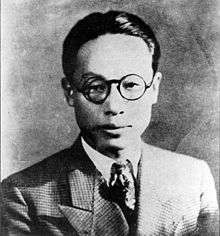Yi Yuksa
| Yi Won-rok | |
|---|---|
 | |
| Born |
May 18, 1904 Andong, Gyeongsangbuk-do, Korean Empire |
| Died |
January 16, 1944 (aged 39) Beijing, China |
| Resting place | Andong, South Korea |
| Pen name | Yi Yuk-sa |
| Occupation | Writer |
| Language | Korean |
| Nationality | Korean Empire |
| Period | 1930-44 |
| Genre | Poetry |
| Literary movement | Korean independence |
| Spouse | An Il-yang (안일양) |
| Children | I Ok-bi (이옥비), I Dong-bak (이동박) |
| Korean name | |
| Hangul | 이원록 |
|---|---|
| Hanja | 李源祿 |
| Revised Romanization | I Won-rok |
| McCune–Reischauer | Yi Wŏn.rok |
| Pen name | |
| Hangul | 이육사 |
| Hanja | 李陸史 |
| Revised Romanization | I Yuk-sa |
| McCune–Reischauer | Yi Yuk.sa |
| Childhood name | |
| Hangul | 이원삼 |
| Hanja | 李源三 |
| Revised Romanization | I Won-sam |
| McCune–Reischauer | Yi Wŏnsam |
Yi Won-rok (May 18, 1904 – January 16, 1944), better known by his pen name Yi Yuksa was a Korean poet and independence activist. As one of Korea's most famous poets, he and his works symbolize the spirit of the Korean anti-Japanese resistance of the 1930s and 1940s.
Life
Yi was born in Dosan-myeon, Andong on May 18, 1904. Yi was a descendant of the scholar Yi Hwang, better known as Toegye. Yi completed his basic education in Andong, graduating at the age of 15 in 1919.[1] In 1920, at age 17, he moved with his family to Daegu and married. Yi became a teacher at the academy at which he studied, but in 1924 left for Japan to study in University.[2]
In 1925 Yi returned to Daegu and along with his brothers, joined the Uiyoldan, an association formed in response to Japanese repression of the Korean Independence Movement. The Uiyoldan was associated with acts of sabotage and assassination.[1] Yi moved to Beijing in 1925/26, likely because of this association, and studied at Sun Yat-sen University in Guangzhou province.[2] Yi returned to Korean in 1927. When members of the Uiyoldan bombed the Daegu branch of the Choseon Bank, Yi was among the arrested and spent 18 months in prison.[1]
In 1929 Yi began to work as a journalist, and in 1930 he published his first poem “Horse,” in the Choseon Ilbo. From 1931 to 1933 he studied in China, but continued to maintain contacts with the Korean resistance. In 1935 he began to concentrate on his writing, publishing both poems and critical essays. Accounts have Yi arrested a total of 17 times.
Death
In 1941 Yi began to suffer from lung disease and underwent treatment. In April 1943 he went to Beijing and apparently began smuggling weapons into Korea. In 1943 Yi returned to Korea on the first anniversary of the death of his mother. He was arrested in Korea and transferred to Beijing, where he died in prison on January 16, 1944, at the age of 39. He was cremated and buried in Miari, Seoul.[1][3]
In 1960, Yi’s remains were reinterred near his birthplace and in 1968 a memorial stone was erected in Andong. Just outside Andong there is the Yi Yuksa Museum, dedicated to the memory of his literature and freedom-fighting.[4]

Work
While Yi only wrote approximately forty poems, the fact that they have come to represent the resistance spirit of the Korean people against the Japanese colonial government has made his work famous in Korea. In 1939 Yi published his most famous poem, “Green Grapes.” Yi strove to write in the tradition of Korean lyric poetry, among other things writing in Hangul at a time during which this was banned by the Japanese government. Because of Japanese censorship, his writing had to be symbolic and metaphorical, never directly commenting on Japanese colonialism, or the issues that surrounded it. Nevertheless, his meaning was clear to Koreans, and because of this and his lyricism, his work continues to be included in school textbooks in Korea.
"The Wide Plain" is perhaps the clearest example of Yi’s ability to combine lyricism with anti-colonial sentiment:
On a distant day,
When heaven first opened,
Somewhere a cock must have crowed.
No mountain ranges,
Rushing to the desired sea,
Could have dared to invade this land.
While the busy seasons gust and fade,
With endless time,
A great river first opens the way.
Now snow falls,
The fragrance of plum blossoms is far off,
I’ll sow the seed of my sad song here.
When a superman comes
On a white horse down the myriad years,
Let him sing aloud my song on the wide plain.[1]
After Yi’s death, in 1946, his brother published some 20 of his works. In 1956 a second edition was published, and in 1974 an authoritative edition was published.
Works in English
- Green Grapes (Cheongpodo, 청포도)
- "The Summit" / "Deep-Purple Grapes" / "The Lake" / "The Wide Plain" / "Flower" / "A Tall Tree" (available in Modern Korean literature: an anthology, Peter Lee)[5]
- The Wind and the Waves: Four Modern Korean Poets [6]
Works in Korean (Partial)
- Sprinkle the seed of my poor song here (내 여기 가난한 노래의 씨를 뿌리라)
In popular culture
Yi Yuksa was portrayed by Kim Dong-wan in the 2011 television drama The Peak (절정).[7]
See also
References
- 1 2 3 4 Yi Yuk-sa: One hundred years. Retrieved on 18 March 2015.
- 1 2 Yeungnam Observer http://observer.yu.ac.kr/news/quickViewArticleView.html?idxno=171
- ↑ Author Database: Lee Yuksa - LTI Korea http://eng.klti.or.kr/ke_04_03_011.do?method=author_detail&AI_NUM=238&user_system=keuser
- ↑ Guidebook of Andong City https://www.msu.edu/~jeongeu4/DC2009/images/Andong%20Information.pdf
- ↑ Lee, Peter (1990). Lee, Peter, ed. Modern Korean literature: an anthology. University of Hawaii Press. ISBN 9780824813215.
- ↑ Lee, Yuksa. The Wind and the Waves. Translated by Lee Sung-Il. ISBN 0895819171.
- ↑ "[광복절 특집극 절정] 이육사 김동완, "‘절정’은 블록버스터 영화보다 더 볼만한 드라마"". 재경일보 (Finance Daily). Retrieved 19 January 2015.